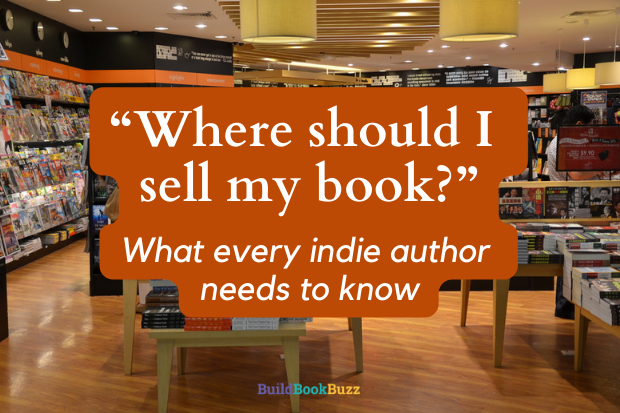“Where should I sell my book?” What every indie author needs to know
"Where should I sell my book?" The answer must always includes "Amazon." Research shows that's where readers prefer to buy books.
Affiliate Disclosure: This post contains affiliate links, which means if you click on them and make a purchase, I will receive a small commission (at no extra charge to you).
An author acquaintance recently announced their new book in a manner that almost guarantees the announcement won’t sell any copies.
Why?
Because they provided a purchase link for an obscure book retailer. While I suspect that was probably to make a statement about how the author feels about Amazon, it’s the wrong link to use when you want to sell books.
When it comes to book sales, Amazon is where it’s at.
Amazon’s share of book sales
Simply put, Amazon sells more books online than anyone else.
Market researcher IBISWorld reports that Amazon is responsible for more than 80% of online book sales in the U.S.
More specifically, according to research firm WordsRated, Amazon has at least 40% of the print book market in the U.S. and 50% of that market in the UK. In addition, it claims two-thirds of e-book sales.
“Where should I sell my book?”
You want to sell your book where people are buying books. This data makes it clear that’s Amazon.
It appears that not everybody realizes this, though.
I’m reminded of this lack of awareness when authors-to-be ask in online groups and forums, “Where should I sell my book online?” or “Should I sell my book on Amazon?”
Both questions suggest:
- They didn’t research how book publishing works before they wrote their book – always a mistake.
- They aren’t book buyers, since most who buy online (the only way to purchase e-books) purchase on Amazon. (And book buyers are readers… and all writers should be readers…so writers should buy books.)
Amazon’s dominance means that it’s the most important place to offer your book for sale if your goal is to get it into the hands of readers.
More reasons to sell on Amazon
There are other reasons to use Amazon as your primary sales outlet, too.
One is that the retailer’s Kindle Direct Publishing (KDP) service makes self-publishing effective and affordable. In fact, without KDP, most self-published books would remain on authors’ computers, never reaching the people they wrote them for.
The KDP system also offers sales data and feedback you can use to monitor how and when your book is selling. This information can help determine which of your marketing activities are working – and which aren’t.
Amazon also offers marketing tools you won’t get elsewhere, including:
- The “read sample” feature (the former more obvious/less hidden “Look Inside”) that lets readers preview the book’s quality
- An easy way for readers to write reviews (a must-have)
- The ability to run on-site ads that can help your book show up in Amazon search results
- Amazon A+ Content, which lets you add quote graphics, photos, other images, and videos to your book’s sales page so it stands out and works harder to sell your books
What other online book retailer offers these services?
None.
Plus, this retail powerhouse offers an established customer base accustomed to buying everything from books to balloons to bassoons on the site.
(And did I mention that Amazon sells more books online than anyone else?)
Should you sell your book through other retailers, too?
If you haven’t enrolled your book in Amazon’s KDP Select program that gives Amazon exclusive e-book sales rights, consider selling your e-book on other retail sites as well. (The KDP Select distribution limitation doesn’t apply to print books.)
Barnes & Noble is probably the best known platform, but I regularly hear from authors who do well on Kobo while others like Smashwords. Those with a strong platform – a following – often sell from their websites, too.
Our article, “Where can you buy books online besides Amazon?,” is a good starting point for identifying where else you might want to sell your books.
Where I buy books online
Also consider your own book-buying habits as you explore options. For what it’s worth, here’s where I buy three book formats online.
E-books
Amazon, because I read on a Kindle. It’s the logical choice.
Print books
Bookshop.org, where my account is linked to my local independent bookseller so it makes money every time I buy a book on the site. I buy in-person at a local bookseller as often as possible, but I use Bookshop to send books as gifts.
Audiobooks
Libro.fm and Chirp. Libro supports indie retailers in the same way Bookshop does, so my purchases there support my designated indie store. Chirp is owned by BookBub, which means that like with BookBub, the daily Chirp emails offer sale prices on audiobooks in categories I’ve selected.

Sell your books on Amazon!
I understand why some people don’t like Amazon. But if you want to sell books, you have no choice but to list there. Consumers have made it clear they want to buy books on Amazon.
So, take advantage of all the retailer offers. Optimize your book’s sales page, too, so it works as hard as it can for you.
And, use your book’s Amazon page link in your marketing, no matter how you feel about the mega-retailer. Sending readers to online retailers they’re not familiar or comfortable with only hurts you, not Amazon.
You’ll serve both yourself and your readers when you use your Amazon link.
Where do you sell your book online besides Amazon? Please tell us in a comment.
Like what you’re reading? Get it delivered to your inbox every week by subscribing to the free Build Book Buzz newsletter. You’ll also get my free “Top 5 Free Book Promotion Resources” cheat sheet immediately!


Besides Amazon, my book is available at Barnes and Noble, and Kobo. John D.
Thanks, John! On which of these platforms do you sell the most books?
Sandy
The question I have is, how much does it hurt your Amazon ranking if you also sell through your website?
I am considering a program where I offer 25% of the sale price to affiliates that send sales to my website. I can’t do this with Amazon because Amazon takes too large of a percentage of the sale, and, it is way harder (and less reliable) to track sales traffic from my affiliates on Amazon.
But, of course, this takes sales away from Amazon and hurts my ranking there. The question is, how to value that impact in order to gauge the cost of a lower Amazon rank on my Amazon sales?
Jon, authors are way more interested in/concerned about Amazon sales rank than readers are, so I don’t think you need to worry about the impact of site sales on Amazon rank. I suspect the average reader doesn’t even know about sales rank.
Is your book priced high enough to attract affiliates? Who do you think will be your affiliates? What system will you use to track affiliate sales and pay commissions? Are you already selling enough books to reassure you that the work involved with setting this up properly will be worth it?
Sandy
As a writer trying to sell one of her 20 books “TABASCO THE SAUCY RACCOON” on Amazon I have had nothing but frustration with Amazon. I have had a Seller Central Account for decades though haven’t used it much during the years that my publisher handled my sales. I never knowingly gave it up. For this most recent of my 20 books, I have received several orders from Amazon but all have been cancelled by Amazon as I had no name and address besides the order NUMBER. I wrote many letters, I even talked to many Amazon employees but still have NOT been given a name and an address to send my books to. All Amazon employees passing ‘the buck’. What to do? Phone my desk phone 1.250-390-9075 please if can help. Or lynhancock@shaw.ca
This sounds incredibly frustrating, Lyn. Have you considered selling your book through KDP instead of through your Seller Central account?
Sandy
I just use my Amazon DTP account to sell my works in paperback format. I actually make more sales on my books by publishing them in e-book format for free through Bookrix than I would by selling them as e-books through DTP. Plus, Bookrix provides me reader view stats on my books, enabling me to determine if I have visibility or conversion issues. DTP quit providing those stats about 10 years ago.
Good to know, Todd. Thanks.
Sandy